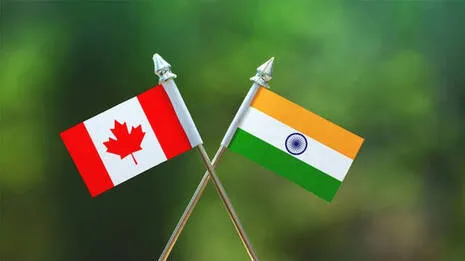
The issue of Khalistan has significantly strained the relationship between India and Canada, culminating in Canadian Prime Minister Justin Trudeau making an open statement. Trudeau admitted the presence of Khalistan sympathizers in Canada but clarified that they do not represent the entire Sikh community in the country. This statement was made during a Diwali celebration organized by the Indian community at Parliament Hill in Ottawa.
Several factors are believed to have led to Trudeau's public remarks. It has long been known that a minority of radical Sikh groups residing in Western countries have been nurturing the Khalistan movement. These groups, however, do not have the support of the majority of the Sikh community.

Following India's suppression of Khalistan-related terrorism within its borders, these groups intensified their activities abroad. Though the Khalistan issue has persisted in Canada for decades, previous Canadian governments maintained a degree of control over these elements. However, the situation changed when Justin Trudeau’s government, which has a slim parliamentary majority, came to power.
It is believed that Trudeau's government had to rely on support from pro-Khalistan elements to remain in office, leading to a soft stance toward the Khalistan movement. This leniency strained India-Canada relations further, especially after Trudeau accused Indian intelligence agencies of involvement in the killing of Khalistani terrorist Hardeep Singh Nijjar in September 2023. Additionally, Canadian police alleged that Indian diplomatic officials had vested interests in the Nijjar case, prompting India to take strict measures.
The potential threat of Khalistani radicals attacking an Indian consulate’s life certificate program at the Triveni Mandir in Brampton in November 2024 forced its cancellation. This incident highlights the strength Khalistani extremists have gained in challenging Canada’s law enforcement and judicial systems. These developments have sparked both domestic and international criticism of Justin Trudeau.
Political analysts predict that Trudeau’s position could weaken in the upcoming elections, prompting a shift in his approach. Trudeau likely realized that levelling a murder accusation against a country like India, one of the world’s largest democracies, was unprecedented and failed to gain significant international support. Additionally, Canada’s economic challenges have placed further pressure on Trudeau’s government.
Recognizing India’s rapidly growing economy, Trudeau seems to have understood the impracticality of maintaining strained ties with such a vital global partner. According to Invest India, Canada is the 18th-largest foreign investor in India, with investments totaling $3.306 billion between 2000 and 2023.
India is also Canada’s ninth-largest trading partner, with over 600 Canadian companies operating in India. Data from India’s Ministry of Commerce indicates that Canada imported goods worth $4.1 billion from India in 2023, while remittances from Canada to India amounted to $859.
8 million in 2022, according to the World Bank. The Canada Pension Plan Investment Board alone has invested approximately ₹1 lakh crore in Indian companies. These significant trade and investment links are undermined by the lack of long-term vision from Trudeau’s administration.
The strained relations between the two countries have raised concerns among Indian students studying in Canada and the Indian diaspora residing there. However, with Indian students contributing 30% of Canada’s annual budget, it is unlikely that diplomatic issues will have a lasting negative impact on the student community. With over 1.
9 million Indians forming a vital demographic in Canada, it is evident that both countries need each other. It is hoped that Canada’s next government will recognize this interdependence. Analysts argue that Canada should focus more on countering Chinese influence than engaging in disputes with India.
In international diplomacy, it is often said there are no permanent friends or enemies, only permanent interests. If nations approach their interests with a sense of morality, challenges can be resolved. (The author is the former president of FOKANA and the founding president of NAMAM (USA).
).









